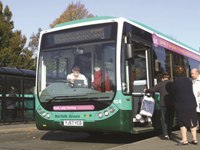
Online petition seeks to avoid crisis next April while Norfolk CC reduces cuts to rural transport
Norfolk Green managing director Ben Colson has appealed to concessionary fare pass holders to join in the fight to encourage the government to offer more funding for the concessionary transport scheme following budget cuts.
The petition was officially launched on Monday with council leaders and MP Brandon Lewis displaying a giant bus ticket demanding the return of £4.5m of funding to Norfolk taxpayers, with vehicles providing a backdrop.
As well as a Fair Fares petition, available online and on many Norfolk buses, the County Council will be linking with Great Yarmouth MP Brandon Lewis who has secured a Westminster Hall debate on rural buses on October 11 to help highlight the county’s plight.
Support for the campaign has come from MPs such as Norman Lamb and Keith Simpson, the Norfolk Rural Community Council, bus operators such as Norfolk Green, First, Anglian, Konect, Sanders and Simonds as well as the Norfolk Chamber of Commerce and the Norfolk and Norwich Association for the Blind.
One operator affected by the shortfall is Norfolk Green, which provides buses throughout West Norfolk and along the coast.
“The shortfall of funding from central government to the county to implement what is a central government social policy is affecting payments to us, which are falling all the time,” said Colson.
“We are getting close to a point where some buses, even full ones, will make a loss and this is something we cannot sustain without being forced, unfairly, to increase fares for other age groups, especially those between 16 and 24 which make up the majority of our fare paying customers. Government has to listen and accept they have got it wrong and take urgent steps to put it right.”
Colson appealed to West Norfolk Older Person’s Forum meeting last week for support in trying to force the government to hold a debate on the funding issue by collecting 100,000 signatures in an on-line petition – although he stressed there is no threat to the scheme.
Colson told the meeting a “crisis” was looming next April but was working to stave off and the government had cut the county’s funding by nearly 40%. He said the company is forced to put on extra buses on some routes, but added with rising fuel costs it is not sustainable.
During the meeting, a suggestion was put forward for the company to introduce a nominal fee for passholders, but Colson said the law currently prohibts this.
Meanwhile, Norfolk County Council has announced its cabinet has backed plans which aim to help protect the future of subsidised post-16 transport for students and reduce the cut in funding faced by rural bus services.
The proposals supported by cabinet are to:
- decrease the original £1m reduction in rural transport support next year (2012-13) to £700,000 over two years and £500,000 in 2012-13; and
- provide an additional £200,000 to post-16 transport to reduce the cost to students or parents of maintaining the service from September 2012.
County Council support for local bus services would then be £3m in 2012-13, and £2.8m in 2013-14.
“The County Council funds over 130 services and only a minority will be affected under the reduced savings I proposed,” said Ian Mackie, deputy leader of Norfolk County Council. “Our staff are working hard to minimise the impact, and we will be consulting local people before we finalise our plans. I also want to recognise the part Norfolk’s bus operators are playing by working with us to help reduce the impact and develop new proposals. In 2013-14 we are confident we can avoid a direct effect on services and find the remaining £200,000 through prudent contract management.
“At the same time we are developing new rural travel and transport options based upon community and demandresponsive transport, as well as car clubs and car sharing. Together these can offer different travel choices when traditional buses don’t offer good value for money.”
He said the funding shortfall in Government support for the concessionary travel scheme was still a major issue for Norfolk, and the County Council would be considering new ways to press Norfolk’s case for fairer funding.
The Fairs Fare online petition can be accessed via www.norfolk.gov.uk or https://www.gopetition.com/petitions/fair-funding-forconcessionary-fares.html Anyone can also register approval of the campaign’s Facebook page by searching https://www.facebook.com/fairfaresnorfolk Hard copy petitions are available for download from www.norfolk.gov.uk


